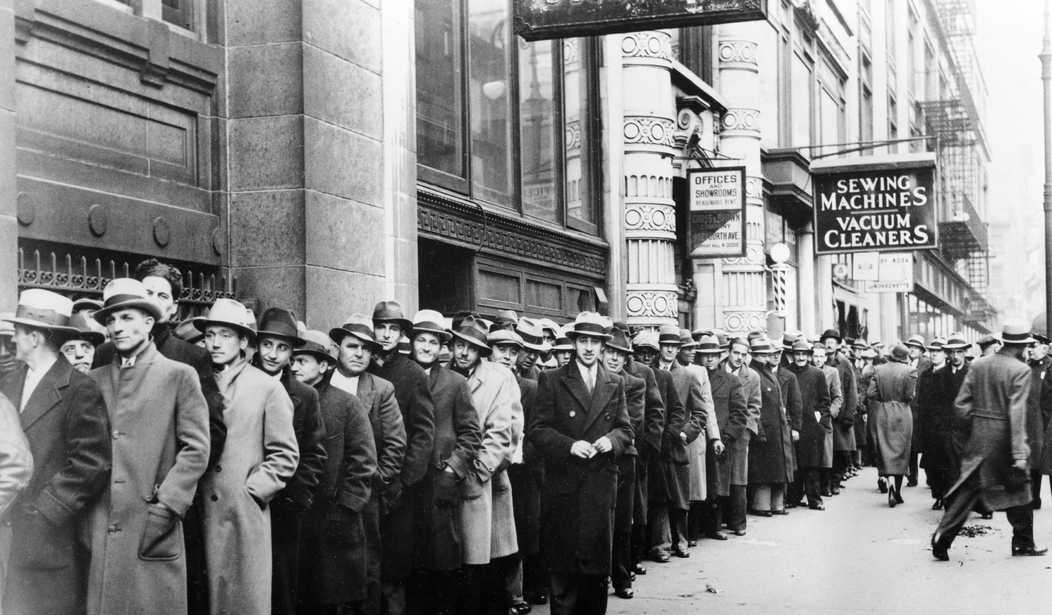The first numbers on unemployment related to the coronavirus came in today, and the fallout is massive. Initial jobless claims last week hit 3.283 million across the United States. That’s four times as high as the previous record of 695,000, set in October 1982, and up from 282,000 the previous week.
The Associated Press reports:
As job losses mount, some economists say the nation’s unemployment rate could approach 13% by May. By comparison, the highest jobless rate during the Great Recession, which ended in 2009, was 10%.
The economic deterioration has been swift. As recently as February, the unemployment rate was at a 50-year low of 3.5%. And the economy was growing steadily if modestly. Yet by the April-June quarter of the year, some economists think the economy will shrink at its steepest annual pace ever — a contraction that could reach 30%.
Widespread reports of delays have occurred as state unemployment agencies report phone lines and websites jammed with traffic. The AP report speculates that these delays may be hiding an even bigger problem. Coupled with the large number of gig workers, self-employed, and free-lancers who have lost work, we could be looking at an economic catastrophe.
The numbers look even starker when you examine them state by state. Again from the AP:
In California, claims for unemployment benefits more than tripled last week to 187,000. In New York, they rose by a factor of five to 80,334. Nationwide, about 2.25% of the entire workforce applied for jobless aid last week. In Nevada, the figure was 6.8%, in Rhode Island 7.5%.
The economic shutdown has been precipitous in the wake of the Chinese COVID-19 pandemic, with many states and municipalities issuing shelter-in-place orders for all workers deemed non-essential. Schools have closed across the country. Idaho became the latest state to issue a statewide shelter-in-place order on Wednesday.
To really drive the point home, the AP quotes a Morgan Stanley economist:
Ellen Zentner, an economist at Morgan Stanley, said in a note to clients that 17 million jobs could be lost through May — twice the entire 8.7 million jobs that were lost in the Great Recession. She expects the unemployment rate to average 12.8% in the April-June quarter, which would be the highest level since the 1930s.
On a positive note, panic shopping has led to a massive expansion in retail. There’s been a huge surge in hiring at all stages of the domestic supply chain to keep the shelves stocked:
As retailers around the nation shut their doors in an effort to curb the spread of the coronavirus, “essential” businesses like grocery stores and pharmacies are seeking support to accommodate overwhelming demand.
Companies including Kroger, Dollar General, and Amazon have listed thousands of job openings for sales associates, distribution workers, and delivery drivers, among others. The jobs — many of which are available immediately and require no background experience — are meant to alleviate overrun stores and warehouses dealing with an influx of orders from panicked Americans stocking up on items like canned goods and toilet paper.
Nevertheless, this contraction has already taken a toll, and it will get worse before it gets better. Alaska Airlines, in a reflection of an expected downturn in economic activity, reduced its flight schedule by 70%:
Alaska Airlines said that it plans to reduce its flight schedule by about 70% in April and May citing drop in demand related to the COVID-19 outbreak across the U.S. and beyond.
Flight schedules for June and beyond will be based on demand, but it expects that reductions will be substantial for at least the next several months, the Airline said in a statement.
Alaska – like other airlines – is seeing demand reductions of more than 80%.
We’re in for a bumpy ride in 2020, as we face an unprecedented and widespread economic shutdown in response to the pandemic.
Jeff Reynolds is the author of the book, “Behind the Curtain: Inside the Network of Progressive Billionaires and Their Campaign to Undermine Democracy,” available now at www.WhoOwnsTheDems.com. Jeff hosts a podcast at anchor.fm/BehindTheCurtain. You can follow him on Twitter @ChargerJeff.










Join the conversation as a VIP Member